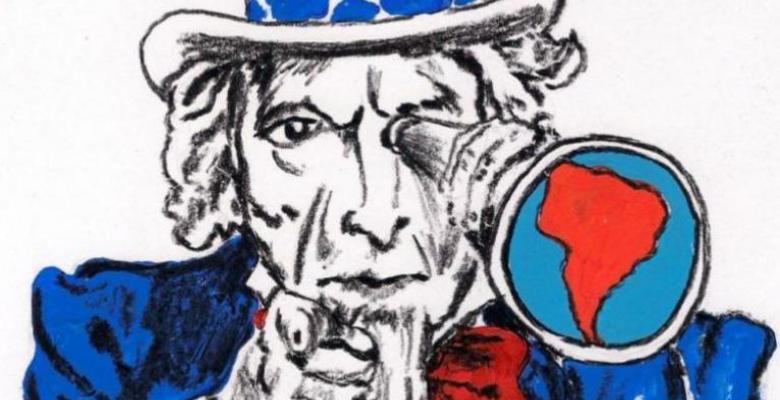The Monroe Doctrine: History and Hysteria Two Hundred Years Later
especiales

In the history of United States-Latin America relations, a constant is distinguished whose development and permanence provides the ideological and geopolitical framework within which the so-called national security interests south of Rio Grande are defined and domination is made workable: the Doctrine Monroe, useful conception and tool of expansionism, interference, and control, inherent to the Latin American policy of the United States. Its purpose has been double, or said in another way, it has operated on a double political standard: the domestic one, promoting the necessary legitimation consensus within that country, and the external one, providing focus to the platform to justify performances in the field of what Martí would call Our America.
From a historical point of view, Monroism has been the support and articulating axis of the aforementioned policy, from the 19th century to the 21st. It expresses the line of continuity, in theoretical-doctrinal and practical-political terms, of a pattern whose variations respond to specific contexts, and to the peculiar exercise of the North American governments in power, which adapt their language and actions to the essence of the aforementioned conception.
Although it was publicly formalized on December 2nd, 1823, the Monroe Doctrine was anticipated before, when what was known as the “law of political gravitation” or “theory of ripe fruit” was announced in April of that year and defined the early imperial desires for Cuba, considered since then as a functional piece of the policy towards Latin America and the Caribbean. It overlaps or overlaps with the narrative of the Manifest Destiny - one of the myths that early continual continental expansion and North American world domination, which materialized with the seizure of a large part of the Mexican territories in the 1840s. It was organically united to Pan-Americanism, since its birth between 1889 and 1890, was related to the North American involvement in the war of 1898, complemented with later additions, such as the Roosevelt Corollary in 1904 and completed from the institutional point of view with the tools of the Inter-American System , after the Second World War, in the 1940s, when the Inter-American Treaty of Reciprocal Assistance (TIAR) and the Organization of American States (OAS) emerged, to which a new mechanism would be added in 1994, fully valid: that of the Summits of the Americas.
The Monroe Doctrine, which originally had the meaning of fence against the eventual intervention of the European colonial powers, really became an ideological guarantee of North American geopolitics. Over time, the founding principle of “America for Americans” and the right of tacit sovereignty over all the territories of the continent, preferably understood as the Western Hemisphere, were reaffirmed.
In the first decades of the 20th century, the economic, political, and territorial expansion of the United States in Latin America testifies to the deepening of Monroism through consecutive and diverse policies: Gunboat Diplomacy, the Big Stick, the Good Neighbor, the Alliance for Progress, among others, that amplify the scope of said doctrine, establishing since its birth the basic contents of the notion of hemispheric security, reflected in the North American way.
This would establish the antecedent of the pattern of contemporary relations with Latin America and the Caribbean, as projected by the United States from the presidency of Dwight Eisenhower to that of Joseph Biden, shared to a large extent, without ignoring accuracies, by Democratic and Republican governments. Before, the region was “protected” from Soviet communist influence. Today, efforts are being made to limit the reach of China and Russia. Our America remains a backyard, facing what is considered external or extra-continental threats. Thus, the ideological and geopolitical assumptions of nineteenth-century times are simply clad in different clothing.
In other words, it’s what the slogan reads, “America for Americans”, which endorsed as legitimate the interference and fictional safeguard of the United States in Latin America, in fact crushed the ideological core framework within which the named conceptions of national security that will mature later, under other historical circumstances, inspiring geopolitical projection through the occupation or control - economic, financial, political, military, diplomatic, ideological - of spaces of power. Initially, it was geographical (territorial, maritime, air). Currently, it includes cultural, cyber, digital, aerospace.
The Monroe Doctrine has projected its silhouette into contemporary history since the invasions of Guatemala in 1954, Cuba in 1961, the Dominican Republic in 1965, Grenada in 1983 and Panama in 1989. Since the I Summit of the Americas, held in Miami in 1994, to the IX, carried out in Los Angeles, in 2022. Since the coup d'état in Chile, with a conventional format, in 1973, fifty years ago, to that in Honduras, with democratic appearance, in 2009. It has fueled irregular wars , in the style of the counterinsurgency of the 1960s, the low intensity conflicts in the 1980s and the unconventional war, in 2010. It has inspired the prolonged aggressive policy against the Cuban, the Sandinista, the Bolivarian, the Ciudadana Revolution in Ecuador and the Democratic-Cultural in Bolivia, achieving success in these last two cases.
The commemoration of Monroism’s bicentennial calls for renewed attention. Its approach promotes, argues, fabricates and makes credible perceptions of threats to national security in Latin America and advocates the need to “protect” it, confusing the naive, the uninformed and those unaware of history. It plays into the hands of the ill-intentioned. It stimulated anti-communist hysteria before and now that which demonizes revolutionary processes, political forces, and leaders. It masks the interest of the United States in exercising its control and dominance, which has never seen the region as a subject of its own security, but as an object of so-called North American security. The Falklands War made clear, in 1982, the fallacy of Monroism. The expected extra-continental aggressor was not a communist country, but an imperialist power, England, which the United States did not confront, but supported.
Translated by Amilkal Labañino / CubaSí Translation Staff













Add new comment